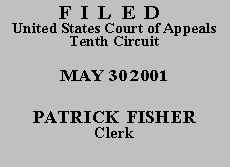

| UNITED STATES OF AMERICA,
Plaintiff-Appellee, v. JOHNNY TODD ALLEN, Defendant-Appellant. |
|
Defendant Johnny Todd Allen appeals his conviction and sentence based on the United States Supreme Court's recent decision in Apprendi v. New Jersey, 530 U.S. 466 (2000). We affirm defendant's conviction and remand the case with directions to vacate defendant's sentence and to resentence him pursuant to 21 U.S.C. § 841(b)(1)(C).
Defendant was charged in a multi-count indictment with conspiring to possess with intent to distribute methamphetamine, marijuana, and cocaine. Although the counts themselves did not identify the precise amount of drugs attributed to defendant, the "MANNER AND MEANS" section of the indictment stated that defendant and his coconspirators "possessed with intent to distribute, and distributed, in excess of one-half kilogram of methamphetamine, one kilogram of cocaine, and hundreds of pounds of marijuana." R., Vol. I, doc. 26 at 5. The jury was instructed that the government need not prove the actual amount of drugs alleged in the indictment. Defendant was convicted and was sentenced to 268 months' incarceration.
After defendant's conviction, the Supreme Court issued its decision in Apprendi, holding that "[o]ther than the fact of a prior conviction, any fact that increases the penalty for a crime beyond the prescribed statutory maximum must be submitted to a jury, and proved beyond a reasonable doubt." 530 U.S. at 490. In United States v. Jones, 235 F.3d 1231, 1236 (10th Cir. 2000), we held that in a drug prosecution under 21 U.S.C. § 841, the quantity of drugs is an essential element of the crime which must be specified in the indictment and determined by a jury in order to sentence a defendant under § 841(b)(1)(A) or (B). Further, if a specific quantity of drugs is not charged in the indictment and determined by a jury, the defendant can only be sentenced to a maximum of twenty years pursuant to § 841(b)(1)(C). Id. at 1236-37.
Defendant argues that because he is challenging both his conviction and his sentence, unlike the defendant in Jones, his conviction must be reversed based on the indictment's failure to allege an essential element of the offense. In response, the government argues that the indictment did set forth the amount of drugs attributable to defendant, and that in any event the indictment was sufficient to charge an offense punishable by § 841(b)(1)(C).
We review a challenge to the sufficiency of an indictment de novo. United States v. Thompson, 237 F.3d 1258, 1261 (10th Cir. 2000). Here, the government argues that the grand jury's identification of specific quantities in the "MANNER AND MEANS" section of the indictment sufficiently described the quantity element so as to support a conviction punishable by § 841(b)(1)(A) or (B). There is no reason to decide this issue, however, because the jury did not determine the amount of drugs attributable to defendant, and therefore a conviction for the quantities identified in § 841(b)(1)(A) or (B) cannot be upheld under Apprendi. As the indictment was clearly sufficient to allege a violation punishable by § 841(b)(1)(C), defendant's conviction itself is not infirm. See United States v. Heckard, 238 F.3d 1222, 1236 (10th Cir. 2001) (holding failure of indictment to cite the correct penalty subparagraph was harmless error).
Defendant argues, and the government concedes, that his sentence must be vacated under Apprendi. Because the jury did not determine the quantity of drugs attributable to defendant beyond a reasonable doubt, the district court erred in sentencing him beyond the twenty-year maximum authorized by § 841(b)(1)(C) for offenses involving an unspecified amount of drugs. See Jones, 235 F.3d at 1238. Therefore, the case must be remanded to allow the district court to resentence defendant within the statutory range authorized by § 841(b)(1)(C).(2)
For the reasons stated, defendant's conviction is AFFIRMED, and the case is REMANDED with directions to vacate defendant's sentence and to resentence him within the statutory range authorized by 21 U.S.C. § 841(b)(1)(C).
Entered for the Court
Circuit Judge
*. This order and judgment is not binding precedent, except under the doctrines of law of the case, res judicata, and collateral estoppel. The court generally disfavors the citation of orders and judgments; nevertheless, an order and judgment may be cited under the terms and conditions of 10th Cir. R. 36.3.
2. Citing the Ninth Circuit decision in United States v. Nordby, 225 F.3d 1053, 1062 (9th Cir. 2000), the government argues that the appropriate remedy is to allow the government "a brief period of time to elect whether it accepts a resentencing of the defendant to the lesser term permitted by the jury's findings," or whether it wishes to retry defendant. Because we have held that defendant's conviction itself is not infirm, we see no reason to offer the government this choice. Cf. id. (stating the choice was not available when defendant's conviction had been accepted as final). In any event, the government has informed us several times that if it were given the choice, it would choose to accept resentencing of defendant. See Appellee's Br. at 3 n.1, 4, 14 n.4.